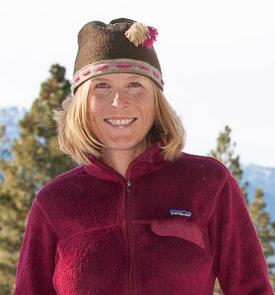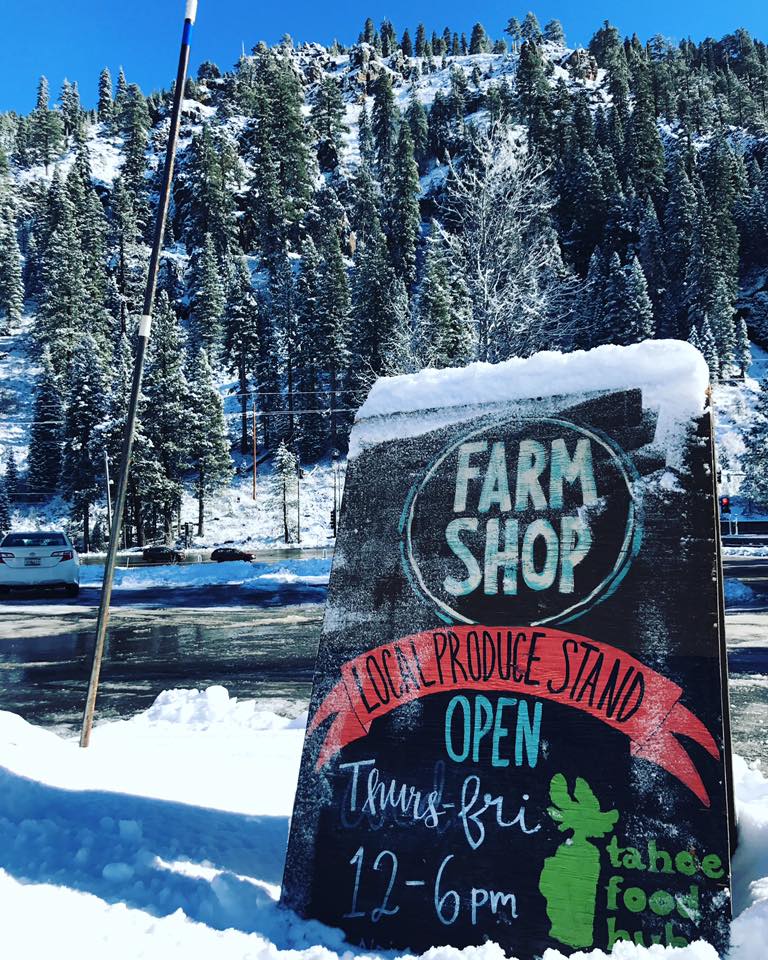Food Hubs are sprouting up across the country, assisting local producers to get product to nearby cities and towns. Traditionally defined as an organization that coordinates production, marketing and distribution of fresh, local food from regional producers, food hubs are designed to improve a local food system.

The Lake Tahoe community is benefiting from one such operation. Founded in 2012 by Susie Sutphin, the Tahoe Food Hub began as a quest to support organic and sustainable agriculture. Realizing the local food system was broken, Sutphin wanted to encourage sustainable agriculture, help the environment on a core level and provide an opportunity for members of the community to become more involved in the great Lake Tahoe food system.

Susie Sutphin, Founder/Executive Director
“We all eat food,” Sutphin said, “and every community should have a food hub to help us think about how and where our food comes from. We can source locally and it is helping to change people’s perspective.”
The Tahoe area has both economic challenges and geographic limitations. While in close proximity to agricultural regions, ----North Lake Tahoe sits within 50 to 100 miles of farms that produce year-round---- smaller farms have difficulty marketing or distributing beyond their district. Sutphin recognized the need for a marketplace for producers as well as access for consumers in the community, and subsequently boosting the area’s economic vitality.

Tahoe Food Hub’s Farm to Market Program increases distribution outlets and facilitates wholesale business for small–scale producers by networking within the community. “If we want to change the food system, we have to get the food into the places where we are most often eating and buying food, which are grocery stores and restaurants” she said.” Over time, the program has also established wholesale relationships with resorts, a school district and a hospital.
“We’re creating an alternative food system, one in which we can represent those farmers, get them a fair price and give them access to wholesale markets, “ Sutphin said. “They may be getting a little lower price through us because it is wholesale, but they are selling more volume.”
To stay true to their commitment of environmental conservation, Tahoe Food Hub is going beyond the organic label and requiring that their member-producers use sustainable farming methods. While over 80 percent of producers are Certified Organic, all members must be following organic, sustainable practices. The idea is that while certification has been beneficial as a nationwide step towards greater food awareness, a focus on farming techniques is more important for a local food system. A smaller farm may not use pesticides or other conventional methods, but hasn’t gone through the costly organic certification process. Sutphin calls it the “Know Your Farmer Certification.” After visiting the farms to confirm that they adhere to their growing requirements, Tahoe Food Hub is able to vouch for and proudly represent their producers. They also work with the farmers to coordinate planting to ensure core crop security and avoid a surplus of certain products.
Lake Tahoe is known as a tourist destination with upscale resorts; however, the local reality is an economy with a high cost of living and a low average income for residents. Food hubs can greatly reduce a community’s food insecurity, where economically-disadvantaged households lack resources to buy fresh, organic food. Or, as Sutphin points out, “you live in a food desert and all you have are convenience stores and fast food restaurants. If you don’t live in an agricultural area then you are food insecure.”
Also, many regions throughout the United States cannot grow food year-round, and are dependent on other agricultural sources in winter. Combined, these factors impact a community’s food insecurity and weaken a local food system.
In addition to the Farm to Market Program, Tahoe Food Hub has a produce subscription program called Buy Your Own Box, primarily for businesses and neighborhoods to provide specific amounts of produce on a weekly basis. The Tahoe Food Hub also collaborates with local hunger relief agencies through their Healthy Food Access Program, donating fruits and vegetables to low income residents and securing equal access to regional produce. To further unify their community around the local food system, the food hub promotes events such as pop-up farm dinners, soup night and a meet-your-baker series.
“As a non-profit we are here to educate the community on why our local food system is important for the environment, the community and the economy” said Sutphin. Her organization takes this education further with a school outreach program, incorporating a geodesic greenhouse that allows for four-season growing in alpine climates.
Ultimately, The Lake Tahoe Food Hub helps provide the entire Lake Tahoe region and its residents equal access to fresh, healthy organic food and greater awareness of the the growers and farmers producing fresh produce.






